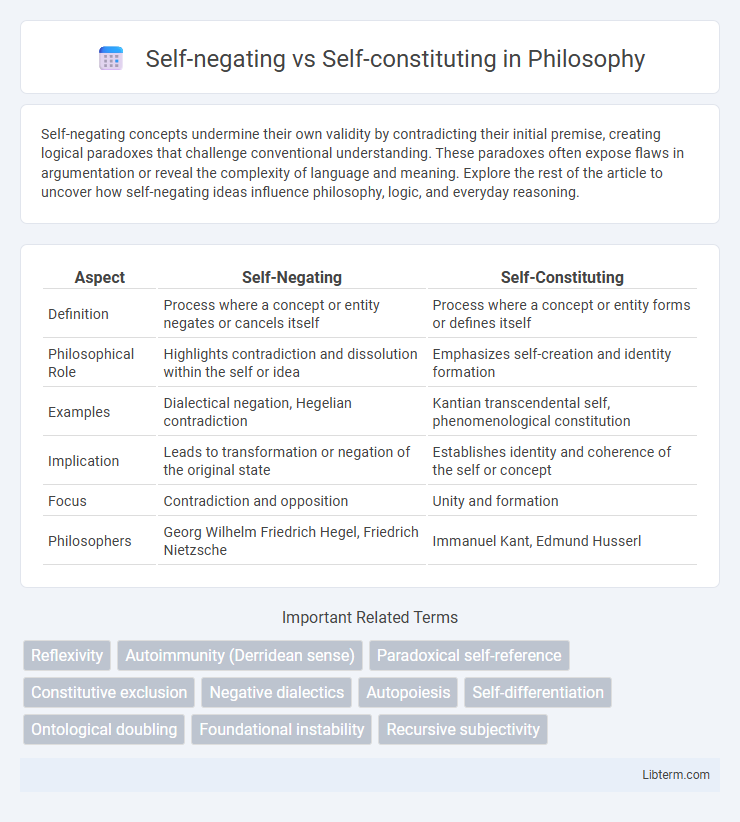Self-negating concepts undermine their own validity by contradicting their initial premise, creating logical paradoxes that challenge conventional understanding. These paradoxes often expose flaws in argumentation or reveal the complexity of language and meaning. Explore the rest of the article to uncover how self-negating ideas influence philosophy, logic, and everyday reasoning.
Table of Comparison
| Aspect | Self-Negating | Self-Constituting |
|---|---|---|
| Definition | Process where a concept or entity negates or cancels itself | Process where a concept or entity forms or defines itself |
| Philosophical Role | Highlights contradiction and dissolution within the self or idea | Emphasizes self-creation and identity formation |
| Examples | Dialectical negation, Hegelian contradiction | Kantian transcendental self, phenomenological constitution |
| Implication | Leads to transformation or negation of the original state | Establishes identity and coherence of the self or concept |
| Focus | Contradiction and opposition | Unity and formation |
| Philosophers | Georg Wilhelm Friedrich Hegel, Friedrich Nietzsche | Immanuel Kant, Edmund Husserl |
Understanding Self-Negating and Self-Constituting Concepts
Self-negating concepts inherently contradict or undermine their own validity, leading to logical inconsistency, as seen in statements like "this statement is false." Self-constituting concepts, by contrast, define and sustain their meaning through self-reference without contradiction, exemplified by the concept of identity in philosophy where the self is both subject and object. Understanding these distinctions clarifies how certain ideas either collapse under their own criteria or establish foundational coherence in semantic and epistemological frameworks.
Origins and Philosophical Background
Self-negating concepts originate in existentialist philosophy, emphasizing how experiences or values cancel themselves out through contradiction or negation. Self-constituting ideas stem from phenomenology and metaphysics, where entities or selves are defined and sustained through their own inherent activities or structures. Philosophers like Sartre explore self-negation in relation to consciousness, while Heidegger and Strawson contribute significantly to self-constitution theories focused on being and identity.
Core Differences Between Self-Negation and Self-Constitution
Self-negation involves rejecting or denying aspects of the self, often leading to internal conflict or identity fragmentation, while self-constitution centers on actively creating and affirming one's identity through choices and actions. The core difference lies in self-negation's tendency to undermine or negate identity components, whereas self-constitution constructs and integrates these elements into a coherent self. Understanding this distinction highlights contrasting psychological processes: deconstruction versus construction of personal identity.
Psychological Implications of Self-Negating Behaviors
Self-negating behaviors, characterized by actions that undermine one's own well-being or identity, often lead to diminished self-esteem, increased psychological distress, and impaired decision-making. These behaviors contrast with self-constituting actions that actively build and reinforce a coherent sense of self and personal agency. Persistent self-negation is linked to mental health issues such as depression and anxiety, highlighting the importance of therapeutic interventions that foster self-acceptance and resilience.
The Role of Self-Constitution in Personal Identity
Self-constitution plays a central role in personal identity by emphasizing how individuals actively create and shape their sense of self through commitments, values, and actions rather than merely existing as fixed entities. Unlike self-negating views that suggest identity diminishes through contradiction or denial of self, self-constituting perspectives highlight the ongoing process of self-understanding and narrative construction that sustains personal continuity over time. This approach underscores the dynamic interplay between agency and identity, where personal identity emerges from the practical enactment of one's core principles and life projects.
How Self-Negating Thoughts Limit Growth
Self-negating thoughts undermine personal growth by fostering a cycle of doubt and low self-esteem, which restricts motivation and resilience. These negative cognitions inhibit the development of a stable self-concept, contrasting sharply with self-constituting beliefs that actively reinforce identity and enable adaptive change. Cognitive behavioral therapy often targets self-negating patterns to promote constructive thinking and psychological flexibility.
Practical Examples: Self-Negating vs Self-Constituting Actions
Self-negating actions undermine their own purpose, such as a promise to be spontaneous that negates spontaneity by imposing a constraint. Self-constituting actions create or define the conditions for their own existence, like making a contract that establishes obligations and rights through the act itself. In practical terms, quitting a habit to improve health is self-constituting, while claiming to act freely by adhering strictly to rules becomes self-negating, as it contradicts the freedom intended.
Societal Impact of Self-Negation and Self-Constitution
Self-negation often leads to social alienation as individuals suppress personal identity to conform, reducing community cohesion and stifling cultural diversity. Self-constitution fosters social innovation and collective agency by encouraging authentic self-expression that shapes shared values and norms. The societal impact of self-constitution generally supports resilience and adaptability, whereas self-negation risks perpetuating systemic oppression and individual disenfranchisement.
Overcoming Self-Negation for Positive Self-Development
Overcoming self-negation involves recognizing and dismantling internalized negative beliefs that hinder personal growth, enabling positive self-development through affirming self-constituting practices. Embracing self-constituting actions fosters a coherent self-identity by actively shaping one's values, goals, and behaviors, which counteracts the fragmentation caused by self-negation. Psychological resilience and self-compassion are key factors that support this transformative process, promoting sustainable positive changes in self-concept and overall well-being.
Strategies to Foster a Self-Constituting Mindset
Strategies to foster a self-constituting mindset include cultivating consistent self-reflection practices that align actions with core values and long-term goals. Emphasizing intentional decision-making enhances autonomy by empowering individuals to actively construct their identity rather than negate it through reactive behavior. Building resilience through adaptive problem-solving techniques supports maintaining self-coherence in the face of external pressures or internal doubts.
Self-negating Infographic

 libterm.com
libterm.com